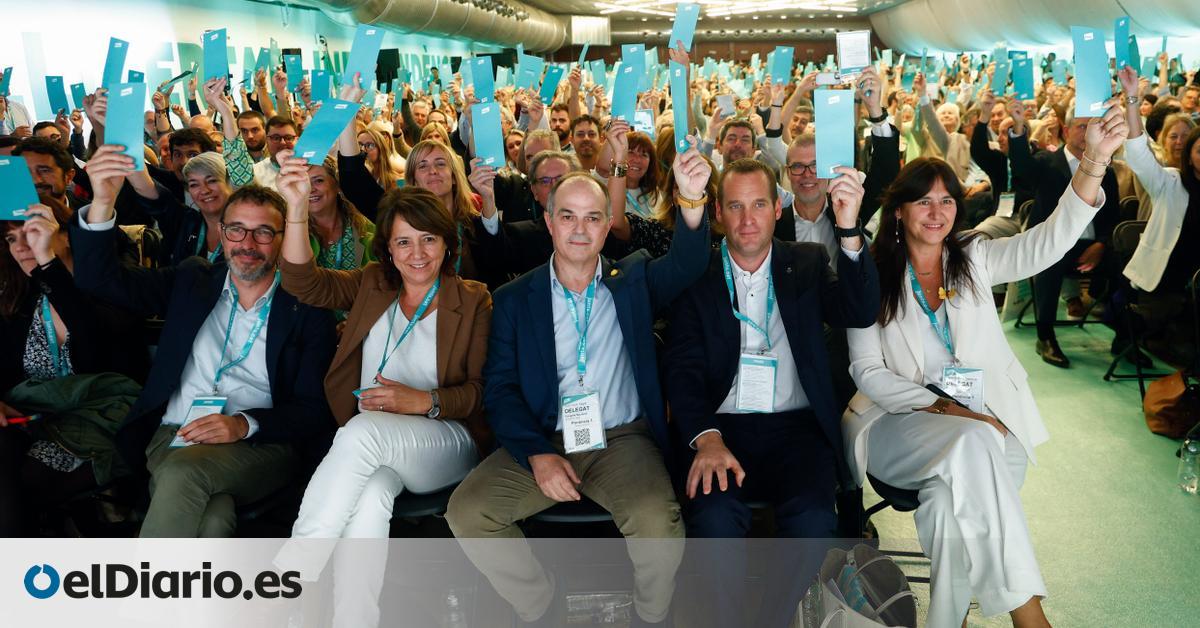
Carles Puigdemont has been living for years in a contradiction that is difficult to solve. On the one hand, he wants to maintain his aura as a “president in exile”, which forces him to act as leader of the group of independentists. But on the other hand, beyond his wishes, the reality is that Puigdemont is the leader of a political party, neither more nor less. That is, a party figure, without political authority beyond his coreligionists.
This dual role has been the reason why Puigdemont has been lurching for eight years. At the last Junts congress, in 2022, the former president chose not to take any party position under the premise that it was due to supposedly more transversal organizations, such as the Consell per la República. I wanted to underline the neutral role of everyone’s president. In fact, Junts has always aspired to be perceived as something more than a normal party, in the image of the transversal coalition that was once Junts pel Sí.
But the dilemma between leading the movement or the party was blown up after the July 2023 elections, when Junts’ votes became the key to Sánchez’s investiture. Puigdemont, without an organic position, put an end to the fiction of the president without a party card and dressed in the colors of Junts to take charge of the negotiations with the PSOE.
The congress that Junts is holding this weekend in Calella is the ceremony that makes this landing in reality official, after almost eight years of fiction. Puigdemont will once again take power as president of the party and Junts will turn the page on the strategy of transversality and soft ideology, to become a typical center-right pro-independence party.
Return to pactism
In the absence of the final vote that must support the former president’s candidacy this Sunday, the delegates have voted throughout Saturday on the organizational, political and strategic presentations. The new coordinates in which the party will move are clarified. The first, Junts is now a pragmatic party regarding possible pacts that allow gradualist conquests, although without renouncing unilaterality. Something that breaks with an entire current of thought, once the majority in the party, that considered the path taken by ERC a “betrayal.”
Now Junts confirms that “political relations with the State are inevitable” and “does not reject negotiation with the State”, although it warns that it will not give away its votes just to maintain the Government of a certain type.
What are the political objectives for which Junts believes, now, that it is worth reaching agreements with non-independence forces? “Defend democracy, end repression, agree on measures that recognize plurinationality and achieve real powers,” they state, in a line that could be shared by a wide range of parties, from the PNV to ERC, passing through Bildu and, of course, also the old CiU.
The Junts that is presented after Calella is a more pragmatic party, but it is also a better-oiled machine to oppose, especially to the Government of Salvador Illa. To achieve this, Puigdemont’s party advocates reinforcing municipalism and capillarity, participating in all aspects of Catalan social life and having a set of ideas and proposals that are open but more defined than in the previous stage.
The new strategy also raises the price of support for Sánchez, although without withdrawing it yet. The amendment that called for breaking the investiture pact in Congress has been rejected and, therefore, the mandate of the Junts leadership is to continue speeding up the negotiation with Moncloa. However, the same text reminds that they will only support the current Government to the extent that it is useful for their interests. In recent weeks there has been speculation about the possibility that Junts could reach understandings with the PP, an option that the party leadership denies.
A more right-wing party
This ideological redefinition has to do with the reproach that the sectors most alienated from the old Convergència have made to the new politicians that have populated Junts in recent years. If Laura Borràs was capable of demonstrating against the Immigrant Detention Centers and Quim Torra gave the green light to an increase in the inheritance tax under his presidency, the veterans believed that this lack of definition reduced their credibility with certain sectors aligned with the most liberal and conservative.
But now, in addition, Junts is no longer a party that is alone in the spectrum of the pro-independence right, where the extreme right of Aliança Catalana has begun to compete, timidly for the moment, but with the potential to expand.
That is why the presentations approved this weekend take a turn on issues such as taxation, security and immigration. Regarding the first, the idea that Junts defends is a general reduction in taxes, which it wants to put “in the European average.” In addition, it proposes a “fair reduction in taxes such as inheritance and personal income tax.”
Security also occupies an important part of Junts’ programmatic document, which argues in favor of increasing the harshness of the Penal Code, providing courts with more financial resources to prevent their collapse, and paying attention to new technologies, taking into account that electronic fraud crimes are the ones that are growing the most. The party also rescues the classic “reinforce the principle of authority”, thanks to which it introduces by surprise in the security section the need to “value the work of teachers.”
Less obvious is the “Catalan integration model” that Junts proposes regarding immigration. This issue is important for the party, which claims all powers in immigration matters and would like to exercise them through a “Catalan immigration agency”, turning the Generalitat into the only reference institution for the population without Spanish nationality living in Catalonia. .
Beyond the need for the arriving population to integrate into Catalan, with special emphasis on the acquisition of the Catalan language, Junts does not specify whether it wants to impose more or less harsh criteria than the current ones for the acquisition of residence or nationality, nor does it define exactly what is meant by the “duties” that it wants to attach to the basic right to appear on the registry of the municipality where one lives.
Turull continues to command the party
At Junts they wanted to stage that the Calella congress served to integrate various traditions and sensitivities in the party. The result of this is the merger agreement with Demòcrates de Catalunya, the formation of the independentists who left Unió in 2015 and who will now be represented by the vice presidency of Toni Castellà.
But, although the entry of new faces in the more than 25 people that make up the new executive is undeniable, there is a much more important element of continuity: the general secretary of Jordi Turull. Since 2022, this veteran who still has many more three-year terms in Convergència than in Junts, has been the one who has directed the training.
Turull’s management has been characterized by both the left hand and the conciliation between sensitivities, which has not prevented him from ending up sidelining the supporters of Laura Borràs, until leaving them out of the executive this Saturday.
Despite the arrival of Puigdemont to the presidency, Turull is expected to continue being the party’s strong man on a day-to-day basis. He will do so accompanied by vice presidents with proven loyalty to their sector, such as Míriam Nogueras, Josep Rius or Mònica Sales.
If between 2017 and 2021 Carles Puigdemont and his team embarked on a race to get as far away as possible from the shadow of Convergència, which they openly denied, in the last two years they have embarked on the opposite path. A return to the origins that now becomes official in Calella and that has the challenge of dusting off the strategy of traditional nationalism but with half the parliamentary strength that it used to have in the time of Jordi Pujol.
Source: www.eldiario.es

